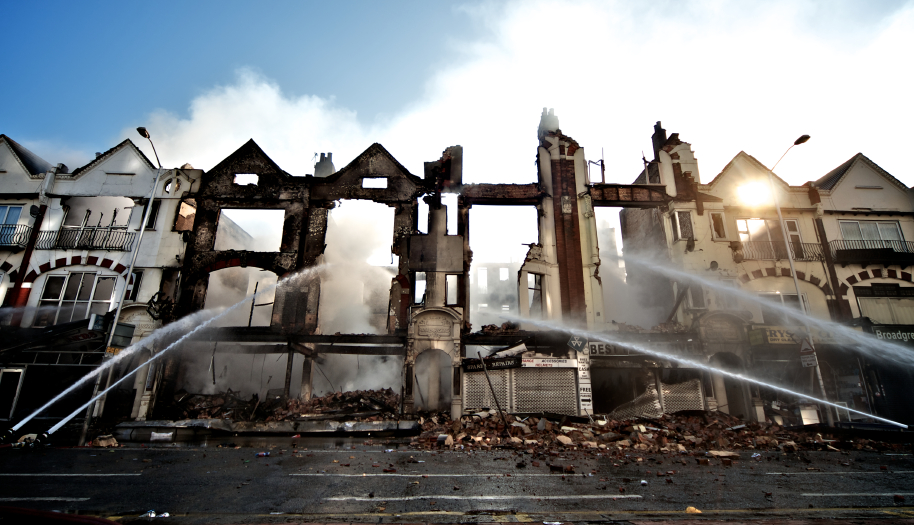[contextly_auto_sidebar]
 Five years on, how would today’s pared-down criminal justice system cope with disorder on the scale of the 2011 riots? It wouldn’t, says defence solicitor Julian Young.
Five years on, how would today’s pared-down criminal justice system cope with disorder on the scale of the 2011 riots? It wouldn’t, says defence solicitor Julian Young.
- Last week we ran an article by a former senior Crown prosecutor who asked to remain anonymous (Five years after the riots – and not a single lesson learned). Both articles appeared previously on LegalVoice (here)
It is five years since almost unprecedented violence erupted on the streets of London and other cities and towns in England. Some participants were fuelled by what happened to Mark Duggan, some were motivated by wanting to enrich themselves unlawfully or have a go at the police and the authorities. The criminal justice system rose to meet the challenge of dealing with large numbers of suspected offenders with its usual professionalism.
In other words, we muddled through without proper facilities or plans. The courts ran through the nights with out-dated facilities and exhausted Benches, staff and lawyers doing their very best in the circumstances. The lessons of the old and unlamented ‘night courts’ scheme seem to have been ignored.
What, if anything has been learned since those momentous events of 2011? I’m afraid that the answer is … very little, if anything.
There are no written and clearly set out plans for dealing with such a series of emergencies (or, if there are, I fear that the defence community was not consulted and the plans have not been disseminated); no plans for additional lawyers to be able to attend police stations and courts at exceptionally short notice. The number of courts and police stations has been cut to the bone, meaning longer travel times (unpaid) for all concerned, lawyers as well as relatives of the accused.
Facilities in courts are woeful. Just go to the defence advocates’ room at, say, Highbury Corner Magistrates’ Court to see the conditions we have to endure. There are insufficient qualified prosecutors, insufficient facilities for charging phones and lap tops, the expensive and much-vaunted court wifi frequently breaks down or is patchy, cells are almost inaccessible, and defence lawyer’s rooms are cramped, and with glass between the client and the lawyer so that forms and documents cannot be signed, photocopiers are not available to defence lawyers – the list is almost endless. In addition, from CPS to defence there has been a steady reduction in funding – and a working criminal justice system is essential to a good and healthy society.
We have learned that, as the Lord Chief Justice eventually confirmed, when push comes to shove, professionals will pull together and make the creaking criminal justice system work. But it takes professionalism and goodwill between all parties: court, prosecution and defence. Professionalism is a given; goodwill, with Criminal Procedure Rules which are applied over-rigorously, with open discourtesy and a visible lack of respect towards the defence lawyers by some members of the Judiciary, is more difficult to define and is flying out of the window as the administrators seek financial savings and swift movement of cases through the system, regardless of other considerations and the constraints on defence lawyers’ ability to prepare cases fully.
What will happen if there is a repeat of those events? The police will arrest suspects; there will be longer delays in lawyers gaining access to fewer and fewer police stations; there will be fewer competent interviewing police officers giving rise to further delays; more cases will be shoe-horned into fewer courts, instead of being spread around the various magistrate’s courts; lawyers will be faced with defendants being produced in court in large numbers together, with little time for all parties to consider evidence, the issues, etc; papers will not be available for the defence lawyers to consider and seek instructions upon; court interviewing facilities will be cramped and inadequate; and public confidence in the criminal justice system will diminish. Is that what we really want? Is that how the UK’s criminal justice system once, and perhaps still, a beacon to the civilised world, wants to be known?
I think and hope not. The civil servants, with the pressures put upon them for financial savings, would point to the words of Sir Humphrey Appleby: “You can’t put the nation’s interest at risk just because of some silly sentimentality about justice.”
I have said it before, and will repeat this ad nauseum: you cannot sacrifice justice on the altars of cost, speed and expediency






